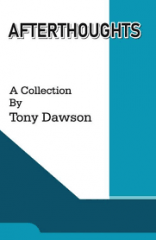Jun 29 2023
London Grip Poetry Review – Tony Dawson
Poetry review – AFTERTHOUGHTS: Charles Rammelkamp finds wit and wordplay in Tony Dawson’s poetry
Afterthoughts Tony Dawson Cyberwit, 2023 ISBN: 978-8119228348 75 pp $15.00,
Often witty, reflective, a little mordant, Tony Dawson takes the long view of our short existence on the planet. Afterthoughts, after all, are reconsiderations of our previous assumptions, a re-evaluation of the meaning and consequences of our behavior. It’s all sifting through memory and observation to mine their meaning. Indeed, as he writes in “Embers,” the opening poem, a recollection of his London childhood during the Blitz, “The embers in remembers / have still not turned to ash.” They’re nowhere near cold.
The collection begins with poems about his family, a sister whom he never knew who died at three months, a loving mother and a gruff father (“Rita,” “Pater Noster”), a brother with whom he had a decades-long feud, who died suddenly from cancer just as the two were beginning to reconcile, leaving the poet with regrets. (‘The futile years of our quarrel were what I most rued’ he writes in “Family Funeral 2.”) These reflections on the passage of his family are summed up more generally in a reflection of the passage of time, which Dawson characterizes as a redneck bully in “Tailgating Time”:
But time doesn’t really pass anyone. It’s a myth. It’s trying to catch you up, drawing inexorably closer and closer. Suddenly, Andy Marvell’s wingèd chariot has become a tailgating pickup truck….
Dawson’s reference here to Andrew Marvell’s “To His Coy Mistress” signals another clever characteristic of his poetry, sly, witty references to literature’s greats, as in his “Parody of ‘I wandered lonely as a cloud’”, the famous Wordsworth lyric which in Dawson’s pen becomes ‘I wandered lonely as a Proud / Boy o’er the Capitol’s windowsills’, one of his several poems that take on political issues.
“Keats Tweets” is another, with an epigraph from John Keats’ famous “On First Looking into Chapman’s Homer.” Dawson’s poem is in the voice of Vasco Núñez de Balboa’s severed head, setting the record straight that he had discovered the Pacific Ocean, not ‘stout Cortez’. Balboa was later beheaded by the Spanish governor of Darién
on a charge of treason. Elizabeth Barrett Browning (“How Do I Love Thee? Let Me Count the Ways”) and Dylan Thomas (“Fade to Black,” in which Dawson alludes to the famous villanelle, “Do not go gentle into that good night”) are likewise springboards for his poems, not to mention Lawrence Ferlinghetti (“Graffiti: Wall to Wall Wisdom” and “I am waiting for the coronavirus to lose its crown”), François Villon (“Ubi sunt qui…?”) and Irving Berlin (“Putin on the Blitz” after “Puttin’ on the Ritz”).
This latter poem is one of half a dozen that address the savagery of the Russian invasion of Ukraine. ‘The maternity hospital was not bombed in error, / it was a deliberate act of Russian terror’ he writes in “Picture Post…Mortem,” one of two poems about the brutal destruction of Mariupol. “Home is not so Sad” likewise refers to the Russian bombardment of Kherson. “Russian Oligarchs From Top Dogs to No-Marks” gives a stark picture of the poisoning and defenestration of Putin’s ruthless treatment of dissidents in his own country (Are you paying attention, Yevgeny Prigozhin?):
The oligarchs now get the message loud and clear: don’t criticize and don’t oppose. Putin rules by fear.
Dawson also takes on the epidemic of gun violence in the United States. “L.A, Christmas Present,” “The Six-Shooter,” “Prudence” and “The Worm in the Rose” all depict the senseless horror of America’s love of guns.
Since 1986, the rose has been the national flower of the USA. But just like Blake’s rose, it’s sick and the worm in the rose is the NRA.
A longtime resident of Seville, where he taught at the local university before retiring, Dawson naturally writes about Spain. Several poems deal with the brutality of the Falangists during the Spanish Civil War, and Francisco Franco’s legacy, as well as several poems involving the homeless in Seville. Boris Johnson in Dawson’s native England is also a target of his Swift-like satire.
But it’s Dawson’s facility with language, apparent in some of the passages already cited, that are the true hallmark of his poetry. There is perhaps no better example of his clever wordplay than the short poem, “Hidden meanings,” which reads:
‘Ire’ lurks in your desire while your eyes conceal a ‘yes’ from everyone but me. I also ‘hear’ your heartbeat and the ‘ask’ hidden by the mask that keeps the virus at bay. You are my touchstone, yet out of reach. My ‘urge’ is purged, your ‘lips’ eclipsed until such time as COVID dies.
Tony Dawson’s Afterthoughts shows us a mind ever grappling with the implications of experience and how we fit – or don’t fit – into the great jigsaw puzzle that pieces together the great human endeavors of life-and-death on earth. The embers in remembers continue to burn bright.

Cajun Mutt Press Featured Writer 09/20/23 – Cajun Mutt Press
21/09/2023 @ 00:40
[…] Tony Dawson has lived in Seville since 1989. His writing has appeared in print in Critical Survey, Shoestring Press, Poems-for-All, Chiron Review, Pure Slush, and Otherwise Engaged Literary Journal as well as online at Loch Raven Review, London Grip, The Five-Two, The Syndic Literary Journal, Horror Sleaze and Trash, Cajun Mutt Press, Poetry and Covid, Beatnik Cowboy, Retreats from Oblivion, and Home Planet News. He has published a collection, Afterthoughts, reviewed here:https://londongrip.co.uk/2023/06/london-grip-poetry-review-tony-dawson/ […]
Cajun Mutt Press Featured Writer 02/29/24 – Cajun Mutt Press
09/02/2024 @ 18:52
[…] Tony Dawson is an English writer who was born in the East End of London in 1937 and has lived in Spain since 1989. He has been published widely both in print and online in the UK and the USA, and in print in Australia. His first collection of poetry, Afterthoughts, was released through Cyberwit in June 2023 and reviewed by Charles Rammelkamp here:https://londongrip.co.uk/2023/06/london-grip-poetry-review-tony-dawson/ […]